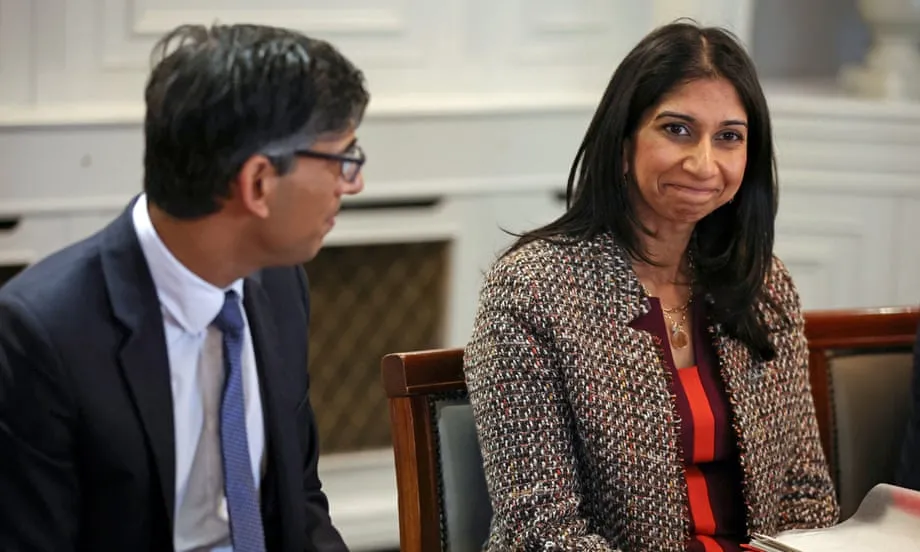Rishi Sunak agreed to a series of measures with Suella Braverman to bring down migration to the UK, including raising the minimum salary threshold to £40,000, according to reports on Monday of a verbal pact with the former home secretary.
While No 10 has denied any formal plan, Kemi Badenoch, the business secretary, hinted on Monday that the salary threshold could be increased anyway as part of “much, much tougher measures” being drawn up.
Braverman, who was sacked by Sunak earlier this month, has repeatedly threatened to release documents showing he had agreed to policy demands on migration before she backed him to become prime minister after the collapse of Liz Truss’s government.
However, the newspaper did not print a copy of the agreement, and said it had not been signed by Sunak. He had verbally agreed to the demands, which was witnessed by others, it added.
Downing Street has repeatedly rejected the characterisation of the discussions as a deal, denying that Sunak agreed to specific policies.
Despite the lack of a printed document, Braverman’s latest salvo in her post-sacking war against No 10 places yet more internal Conservative pressure on Sunak after last week’s net migration statistics, which showed they had reached a record 745,000 in the year to December 2022.
Downing Street is believed to be working on plans to get the figure down, with likely routes including further curbs on the dependants that new arrivals can bring with them, as well as a possible rise in the salary cap.
While Sunak is facing intense pressure from MPs on the right of his party over the issue, No 10 is also very aware that many of the arrivals have come to work in the NHS and care homes, and that clamping down on student visas could harm the finances of universities, which use overseas fees to cross-subsidise the studies of UK students.
“We know that there are many levers – the salary threshold is one, dependants are another,” she said. “I am certainly in favour of us doing whatever it takes to bring the numbers down to a sustainable level … I don’t know what the plan is, but I certainly will be pushing for the strongest measures possible.”
Saying she had had “reservations” about the initial post-Brexit migration policy introduced under Boris Johnson, Badenoch added: “I think that you will be seeing much, much tougher measures going forward.”
Speaking earlier to Sky News, Badenoch hit back at Johnson after the former prime minister used his weekly Daily Mail column to express regret at how his points-based migration system had ended up working.
“The points-based system was one that he brought in, and the figures that we’re looking at are figures that came up while he was prime minister,” she said.
“This prime minister, this home secretary and the rest of the cabinet, as well as all of government, will be working hard to make sure that we bring it down. As far as I know, the figures for the coming year will be lower.”
Sunak faces parallel pressure over his response to the supreme court’s ruling against a plan to deport to Rwanda asylum seekers who arrive unofficially in the UK.
An upgraded treaty on the plan with Rwanda and a law intended to set aside the court’s verdict, both initially expected immediately after the ruling, have been delayed.
MPs on the right of the Tory party want the PM to commit to legislate to formally derogate from parts of the European convention on human rights, or to leave the treaty altogether, something that has alarmed other Conservatives.



